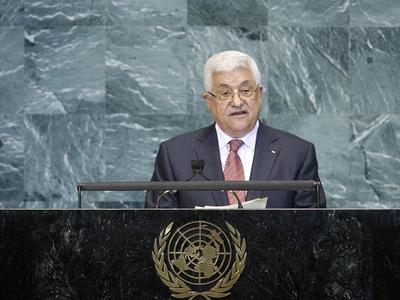 Palestinian Authority President Mahmoud Abbas was re-elected to lead the Fatah party Tuesday as the movement opened its first congress since 2009 with talk mounting of who will eventually succeed the 81-year-old.
Palestinian Authority President Mahmoud Abbas was re-elected to lead the Fatah party Tuesday as the movement opened its first congress since 2009 with talk mounting of who will eventually succeed the 81-year-old.
Abbas was re-elected by consensus, Fatah party spokesman Mahmud Abu al-Hija said, and was due to address the congress at 6:00pm (1600 GMT). Some 1,400 delegates were attending.
The election of members of Fatah’s parliament and its central committee over the five-day conference will signal the direction the oldest Palestinian party will take at a time when Abbas is weakened by his own unpopularity and internal dissent.
While the ageing leader has said he has no intention of stepping aside anytime soon, talk of who will eventually succeed him as president has intensified. He has not publicly designated a successor.
Some analysts see the congress as an attempt by Abbas to marginalise political opponents, including longtime rival Mohammed Dahlan, currently in exile in the United Arab Emirates.
Observers have seen the reduced number of officials to vote — down from more than 2,000 in 2009 — as part of a move to exclude Dahlan supporters.
Opponents and dissidents
Dimitri Diliani, elected to Fatah’s revolutionary council, or parliament, in 2009, said he was not invited to the congress like dozens of others because “we bring a different voice”.
He said a press conference set for a refugee camp near Ramallah on Tuesday with those recently dismissed from the party had been called off after threats “from the security services”, including death threats.
Jibril Rajoub, a former intelligence chief, current head of the Palestinian Football Association and Fatah central committee member, acknowledged “opponents and dissidents” had not been invited, but said “the priority is to hold the congress”.
Rajoub also said the gathering will provide an opportunity to update the party’s structures.
“The system from the 1960s no longer works in 2016,” he told AFP.
“We have to take into account the current circumstances. The current system was created when we were in the diaspora and we are now on national soil. It was put in place at a revolutionary stage. Now we have a state.”
Saeb Erekat, Palestine Liberation Organisation secretary general and Fatah central committee member, said the congress will allow the party to “choose leaders for the next stage”.
Stalled peace efforts
But the congress also comes at a difficult time for the push to create a Palestinian state, with the cause overshadowed by other crises in the region.
The incoming Donald Trump administration in the United States has signalled its policies will be far more favourable to Israel.
Peace efforts have been at a standstill since a US-led initiative collapsed in April 2014.
Israel is concerned that US President Barack Obama may take action related to the conflict before he leaves office in January, but his intentions remain unclear.
In an op-ed published in the New York Times on Tuesday, former US president Jimmy Carter called on Obama to recognise a Palestinian state before his term is up.
The congress also comes with Fatah and its Islamist rival Hamas, in power in the Gaza Strip, still deeply divided. Fatah dominates the Palestinian Authority, which runs the Israeli-occupied West Bank.
Israel has prevented dozens of Fatah members in Gaza, which is under an Israeli blockade, from attending the conference, said party spokesman Mahmud Abu al-Hija.
Israeli authorities did not immediately respond to a request for comment. Israel controls all borders of the Palestinian territories apart from the Gaza-Egypt frontier.
Abu al-Hija, the Fatah spokesman, said an objective of the congress is to determine how to act in the face of stalled peace negotiations.
Peace initiatives being promoted by France and Arab nations will be discussed, as will the possibility of a UN Security Council resolution against Israeli settlement building in the West Bank.
Fatah is the main component of the PLO, created in 1964 in Jerusalem, which brought together the main Palestinian nationalist movements of that time.
(FRANCE 24 with AFP)

Leave a Reply
You must be logged in to post a comment.